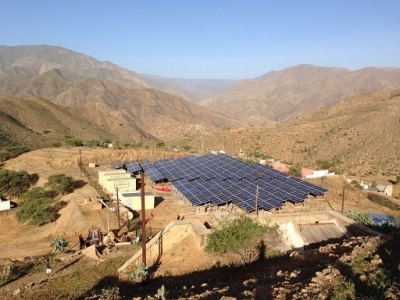Enertronica has been awarded two EU calls
Asmara, 18 January (Askanews) - Eritrea, as the Horn of Africa, is rich in sun and the Eritrean government believes in the development of solar energy, against an availability of 6 kilowatt hours per square meter per day: twice dell ' Italy and six times that of the UK. And he believes Antonio Bonanni, project manager Enertronica Italian company, engaged in Eritrea in the construction of photovoltaic plants after being awarded two tenders launched in recent years by the European Union in its cooperation with the country in the Horn of Africa and funded through the European development Fund (EDF). Little wonder, then, that the plan agreed in Brussels with Asmara for the years 2016-2020, announced last December, provides for aid to 200 million euro in support of the energy sector, in the face of "one of the lowest access rates to 'electricity "that severely restricts economic development, as well as the population's access to social services such as schools, hospitals and health centers.
"Less than 50% of the population has access to electricity," he said to askanews Bonanni. In fact, in the same capital Asmara is normal to remain in the dark for a few hours during the day and only the wealthy have generators, fueled by diesel, the cost is prohibitive for the majority of the population.
The absence of electricity also often leads to a lack of water, so that most of the housing is equipped with tanks and tanks. "Eritrea has an electricity network that needs to be put in place - said the project manager of Enertronica - because in addition to having a few stations, the network is old, has low efficiency, so the energy that is to create is dispersed and this explains why less than 50% of the population has access to electricity. " To address this situation, the Asmara government began to focus on solar energy, "entering in photovoltaic systems also batteries, which are loaded during the day for use at night."
Enertronica won a first European tender worth a million euro in October 2014, for the creation of a smart grid that, thanks to the simultaneous and coordinated presence of photovoltaics, batteries, diesel generators and intelligent interface to the network national distribution of electricity, can guarantee continuity with the energy needs of the training center and research ERCOE (Eritrean Centre for Organisational Excellence). According to Bonanni, the government has chosen the Ercoe to launch a "pilot plant", which feeds the training center in business and management, located 35 kilometers from Asmara. "From this project it is then born the second, consisting of 73 plants, which will go instead to fuel agricultural centers, a research laboratory of the Ministry of Agriculture, veterinary clinics, an egg collection center," added the manager, referring to the second EU ban, from 7 million euro, won the Italian company in February of 2015.
"Now start the projects for the population," said Bonanni. And in fact, reading the National Indicative Programme (Nip) 2014-2020 which will be financed by the EU, it is clear the intention of the government in Asmara to focus on photovoltaics, but also wind energy, to ensure electricity to the population, improve access to services, and especially to support economic development in the agricultural and fishing sectors in centers. The Nip also involves restoring the electricity networks of Asmara and Massawa, to improve efficiency, but also the development of a national plan for energy development of the country for the next 25 years, including the study of other sources of clean energy , including geothermal.
When asked what are the main problems that a company is facing in Eritrea, Bonanni has lamented the lack of "qualified personnel" and the absence of civil works. The difficulty in finding qualified personnel has prompted the Italian Embassy to launch a course for installers of photovoltaic systems in the Italian School of Asmara in collaboration with Enertronica. Bonanni says enthusiastically of lectures to students of the last years of the Science and the Institute High School for surveyors. In addition to the lectures the course also provides internships in the yards of Enertronica, with the ability to offer to the most deserving students taking from the company.
"The initiative - Embassy state - aims both to give young people an opportunity to work in Eritrea is qualified to ensure companies that win contracts in the renewable energy sector the chance to find professional profiles corresponding to their needs" .




